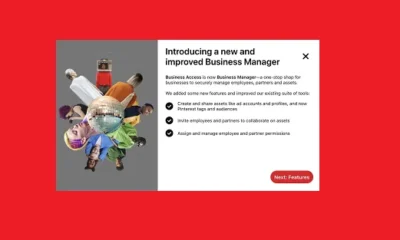MARKETING
11 Companies on Pinterest That Are Crushing It
If you think Pinterest is just a place to find recipes and fine-tune wedding planning details, think again. With over 431 million users coming to Pinterest every month to look for inspiration, Pinterest is an effective platform for building your audience and getting your product in front of potential customers who are ready to buy.
According to a HubSpot Blogs survey of 310 marketing professionals, 39% of marketers said Pinterest generated a high return on investment.
With an effective Pinterest strategy in place, you can generate organic web traffic, create targeted ad campaigns to reach your ideal buyers, and sell directly from the platform. Gather inspiration from these brands who are yielding big results through Pinterest.
Table of Contents:
- IKEA
- IT Cosmetics
- Jonas Paul Eyewear
- Michaels
- Primally Pure
- Mayvenn
- Samsung
- La Mer
- Lavendaire
- Golde
- The Good Trade
11 Best Brands on Pinterest
1. IKEA
What we like: IKEA’s innovative integration of its lead-generating quiz and Pinterest recommendations.

IKEA is a globally-recognized brand with countless product options and configurations. Shopping for new furniture and houseware can be an overwhelming experience, and IKEA is reducing customer overwhelm through creative Pinterest marketing.
Potential customers can take IKEA’s Renocations quiz to unlock which IKEA items would best suit their home. At the end of the quiz, users are given a Pinterest board of IKEA products they make like, and can then pin the options to their personal boards for inspiration, or shop directly through Pinterest when they’re ready to buy.

This approach works because many customers turn to Pinterest for decorating ideas and to save potential product finds in one place. The integration of product recommendations and pre-populated Pinterest boards is creative and solves a real need for customers who are looking to streamline the furniture buying process.
2. IT Cosmetics
What we like: Savvy keyword targeting.

According to Pinterest, 91% of beauty searches on the platform are unbranded. That means when users are typing beauty-related keywords in search, they aren’t searching for specific brands. Upon learning this statistic, IT Cosmetics implemented a keyword-first Pinterest strategy to reach users who were searching for CC cream on the platform.
This strategy gave the brand the opportunity to be found by users who were interested in learning more about CC cream and other cosmetic products but didn’t yet have loyalty to any specific brand.

Looking through the IT Cosmetics Pinterest account, several pins are optimized to be found in CC cream-related. The brand’s Pinterest content shows its products in action through tutorial-based videos so users can see how the products work in real-time. This approach has helped IT Cosmetics expand its organic reach on Pinterest, and acquire new customers.
3. Jonas Paul Eyewear
What we like: Clear ideal customer identification.

Eyewear brand Jonas Paul makes affordable, on-trend frames for kids and teens. Knowing the ideal potential customers for the brand are parents looking for eyewear for their children, Jonas Paul creates organic and paid Pinterest content specifically for parents.
Implementing this strategy has helped the brand increase web traffic from Pinterest, resulting in higher order value than web visitors from other channels.
4. Michaels
What we like: Seasonal posts and use of Idea Pins.

Pinterest is a great place to find inspiration for your next creative project, so it makes sense that craft store Michaels would perform well on the platform.
The Michaels Pinterest account has a variety of beautiful search-driven posts that are aligned with what users are searching for each season. Content pinned to the Michaels Pinterest account often features videos of seasonal craft projects directly linking to items that can be purchased from Michaels.
The brand also runs keyword-focused holiday campaigns, targeting users who search for terms related to projects that can be executed with products from the store. In addition to driving online conversions, Michaels’ Pinterest efforts have also increased in-store traffic by 8%.
5. Primally Pure
What we like: Educational content to nurture new customers.

Primally Pure is a natural beauty brand that makes non-toxic deodorant and body care products. The brand’s Pinterest account has been one of its key drivers of growth.
On Pinterest, the Primally Pure account is focused on holistic lifestyle education and captures users who want to learn more about skincare and the potential side-effects of conventional product options. With many pins leading back to the company blog where there are in-depth articles on various topics the brand’s ideal customer would be interested in, this inbound marketing approach is an effective way to build trust and educate an audience.
6. Mayvenn
What we like: Video demonstrations of Mayvenn’s various products.

Mayvenn sells affordable hair extensions and related products to hairstylists and salon owners. With this ideal customer in mind, Mayvenn’s Pinterest content has a variety of tutorial-based posts to show stylists how they can use Mayvenn’s products on their clients. In addition to tutorials, Mayvenn shares pins related to hairstyle inspiration that are easily searchable.
The brand also features photos of their products fully styled so users can see exactly how the potential hairstyle they want to create will look.
7. Samsung
What we like: Aspirational product content.

Samsung is a global brand that makes a range of products, but on Pinterest, the brand’s home appliance account truly shines.
Appliances and home inspiration are popular search topics on Pinterest, and Samsung has created an impressive brand account creating beautiful imagery with its products front and center. The brand stays at the forefront of Pinterest’s latest features using video and Idea Pins to showcase how its products work to users who are looking for pins to help them create their dream homes.
The Samsung Home Pinterest account also has boards related to key home-related search topics such as “How to Clean” and “Kitchen Ideas.” The content on these boards consists of organic and user-generated pins that subtly feature Samsung’s products.
8. La Mer
What we like: Cohesive brand identity and Pinterest-exclusive products.

Luxury skincare brand La Mer is known for having high-end products that are often deemed celebrity favorites. The brand leverages Pinterest as a key part of its marketing strategy.
Not only are the visuals on the La Mer account cohesive, but the brand has found creative ways to generate new business through Pinterest. La Mer launched a video ad campaign to showcase the benefits of its products. Users who engaged with the ads were sent product samples to increase engagement and customer reviews.
In addition to its ad strategy and sampling campaign, La Mer has created product sets that are exclusively available through Pinterest, enticing users who discover the brand through Pinterest to make a purchase that isn’t available anywhere else.
9. Lavendaire
What we like: Natural-looking videos showing the company’s products in use.

Lavendaire is a personal development brand that sells journals and apparel. The Lavendaire Pinterest account organically garners three million monthly views to drive traffic to the brand’s products and other content channels.
A particular area where Lavendaire shines on Pinterest is through the creation of Idea Pins. The Idea Pins feature is a primary focus area for Pinterest, and the Lavendaire brand frequently shares new Idea Pins showcasing the company’s journaling products.
With journaling being a high-traffic search term on Pinterest, pins shared by Lavendaire are optimized to show up in journaling-related search results helping Pinterest users find and connect with the brand and community.
10. Golde
What we like: Colorful visuals, and recipe-based content.

Wellness superfood brand Golde has an impressive Pinterest account that features its product line in a variety of ways. The account has video posts that are beautifully shot and feature Golde products used in recipes and tutorials.
In each of the brand’s educational and recipe videos, the pin is linked directly to the product featured helping the brand drive sales from users who are looking for recipe inspiration and new creative ways to use products such as matcha and cacao.
11. The Good Trade
What we like: Organic traffic generation.

The Good Trade is an online publication that covers topics related to sustainability and slow living. The company’s Pinterest account has almost 10 million organic monthly views, which is an impressive feat.
Though The Good Trade doesn’t currently run Pinterest ads, the brand creates pins for all of its articles, generating traffic back to its website.

The brand relies on keywords and hashtags to create pins that can be found through search and has built an engaged audience on Pinterest to convert into readership.
If your company isn’t on Pinterest yet, now is the perfect time to get started. Whether you have an eCommerce business, brick-and-mortar store, or your content is your product – users on Pinterest are likely searching for what you have to offer.
MARKETING
Tinuiti Marketing Analytics Recognized by Forrester

Rapid Media Mix Modeling and Proprietary Tech Transform Brand Performance
Tinuiti, the largest independent full-funnel performance marketing agency, has been included in a recent Forrester Research report titled, “The Marketing Analytics Landscape, Q2 2024.” This report comprehensively overviews marketing analytics markets, use cases, and capabilities. B2C marketing leaders can use this research by Principal Analyst Tina Moffett to understand the intersection of marketing analytics capabilities and use cases to determine the vendor or service provider best positioned for their analytics and insights needs. Moffett describes the top marketing analytics markets as advertising agencies, marketing dashboards and business intelligence tools, marketing measurement and optimization platforms and service providers, and media analytics tools.
As an advertising agency, we believe Tinuiti is uniquely positioned to manage advertising campaigns for brands including buying, targeting, and measurement. Our proprietary measurement technology, Bliss Point by Tinuiti, allows us to measure the optimal level of investment to maximize impact and efficiency. According to the Forrester report, “only 30% of B2C marketing decision-makers say their organization uses marketing or media mix modeling (MMM),” so having a partner that knows, embraces, and utilizes MMM is important. As Tina astutely explains, data-driven agencies have amplified their marketing analytics competencies with data science expertise; and proprietary tools; and tailored their marketing analytics techniques based on industry, business, and data challenges.
Our Rapid Media Mix Modeling sets a new standard in the market with its exceptional speed, precision, and transparency. Our patented tech includes Rapid Media Mix Modeling, Always-on Incrementality, Brand Equity, Creative Insights, and Forecasting – it will get you to your Marketing Bliss Point in each channel, across your entire media mix, and your overall brand performance.
As a marketing leader you may ask yourself:
- How much of our marketing budget should we allocate to driving store traffic versus e-commerce traffic?
- How should we allocate our budget by channel to generate the most traffic and revenue possible?
- How many customers did we acquire in a specific region with our media spend?
- What is the impact of seasonality on our media mix?
- How should we adjust our budget accordingly?
- What is the optimal marketing channel mix to maximize brand awareness?
These are just a few of the questions that Bliss Point by Tinuiti can help you answer.
Learn more about our customer-obsessed, product-enabled, and fully integrated approach and how we’ve helped fuel full-funnel outcomes for the world’s most digital-forward brands like Poppi & Toms.
The Landscape report is available online to Forrester customers or for purchase here.
MARKETING
Ecommerce evolution: Blurring the lines between B2B and B2C

Understanding convergence
B2B and B2C ecommerce are two distinct models of online selling. B2B ecommerce is between businesses, such as wholesalers, distributors, and manufacturers. B2C ecommerce refers to transactions between businesses like retailers and consumer brands, directly to individual shoppers.
However, in recent years, the boundaries between these two models have started to fade. This is known as the convergence between B2B and B2C ecommerce and how they are becoming more similar and integrated.
Source: White Paper: The evolution of the B2B Consumer Buyer (ClientPoint, Jan 2024)
What’s driving this change?
Ever increasing customer expectations
Customers today expect the same level of convenience, speed, and personalization in their B2B transactions as they do in their B2C interactions. B2B buyers are increasingly influenced by their B2C experiences. They want research, compare, and purchase products online, seamlessly transitioning between devices and channels. They also prefer to research and purchase online, using multiple devices and channels.
Forrester, 68% of buyers prefer to research on their own, online . Customers today expect the same level of convenience, speed, and personalization in their B2B transactions as they do in their B2C interactions. B2B buyers are increasingly influenced by their B2C experiences. They want research, compare, and purchase products online, seamlessly transitioning between devices and channels. They also prefer to research and purchase online, using multiple devices and channels
Technology and omnichannel strategies
Technology enables B2B and B2C ecommerce platforms to offer more features and functionalities, such as mobile optimization, chatbots, AI, and augmented reality. Omnichannel strategies allow B2B and B2C ecommerce businesses to provide a seamless and consistent customer experience across different touchpoints, such as websites, social media, email, and physical stores.
However, with every great leap forward comes its own set of challenges. The convergence of B2B and B2C markets means increased competition. Businesses now not only have to compete with their traditional rivals, but also with new entrants and disruptors from different sectors. For example, Amazon Business, a B2B ecommerce platform, has become a major threat to many B2B ecommerce businesses, as it offers a wide range of products, low prices, and fast delivery
“Amazon Business has proven that B2B ecommerce can leverage popular B2C-like functionality” argues Joe Albrecht, CEO / Managing Partner, Xngage. . With features like Subscribe-and-Save (auto-replenishment), one-click buying, and curated assortments by job role or work location, they make it easy for B2B buyers to go to their website and never leave. Plus, with exceptional customer service and promotional incentives like Amazon Business Prime Days, they have created a reinforcing loyalty loop.
And yet, according to Barron’s, Amazon Business is only expected to capture 1.5% of the $5.7 Trillion addressable business market by 2025. If other B2B companies can truly become digital-first organizations, they can compete and win in this fragmented space, too.”
If other B2B companies can truly become digital-first organizations, they can also compete and win in this fragmented space
Joe AlbrechtCEO/Managing Partner, XNGAGE
Increasing complexity
Another challenge is the increased complexity and cost of managing a converging ecommerce business. Businesses have to deal with different customer segments, requirements, and expectations, which may require different strategies, processes, and systems. For instance, B2B ecommerce businesses may have to handle more complex transactions, such as bulk orders, contract negotiations, and invoicing, while B2C ecommerce businesses may have to handle more customer service, returns, and loyalty programs. Moreover, B2B and B2C ecommerce businesses must invest in technology and infrastructure to support their convergence efforts, which may increase their operational and maintenance costs.
How to win
Here are a few ways companies can get ahead of the game:
Adopt B2C-like features in B2B platforms
User-friendly design, easy navigation, product reviews, personalization, recommendations, and ratings can help B2B ecommerce businesses to attract and retain more customers, as well as to increase their conversion and retention rates.
According to McKinsey, ecommerce businesses that offer B2C-like features like personalization can increase their revenues by 15% and reduce their costs by 20%. You can do this through personalization of your website with tools like Product Recommendations that help suggest related products to increase sales.
Focus on personalization and customer experience
B2B and B2C ecommerce businesses need to understand their customers’ needs, preferences, and behaviors, and tailor their offerings and interactions accordingly. Personalization and customer experience can help B2B and B2C ecommerce businesses to increase customer satisfaction, loyalty, and advocacy, as well as to improve their brand reputation and competitive advantage. According to a Salesforce report, 88% of customers say that the experience a company provides is as important as its products or services.
Market based on customer insights
Data and analytics can help B2B and B2C ecommerce businesses to gain insights into their customers, markets, competitors, and performance, and to optimize their strategies and operations accordingly. Data and analytics can also help B2B and B2C ecommerce businesses to identify new opportunities, trends, and innovations, and to anticipate and respond to customer needs and expectations. According to McKinsey, data-driven organizations are 23 times more likely to acquire customers, six times more likely to retain customers, and 19 times more likely to be profitable.
What’s next?
The convergence of B2B and B2C ecommerce is not a temporary phenomenon, but a long-term trend that will continue to shape the future of ecommerce. According to Statista, the global B2B ecommerce market is expected to reach $20.9 trillion by 2027, surpassing the B2C ecommerce market, which is expected to reach $10.5 trillion by 2027. Moreover, the report predicts that the convergence of B2B and B2C ecommerce will create new business models, such as B2B2C, B2A (business to anyone), and C2B (consumer to business).
Therefore, B2B and B2C ecommerce businesses need to prepare for the converging ecommerce landscape and take advantage of the opportunities and challenges it presents. Here are some recommendations for B2B and B2C ecommerce businesses to navigate the converging landscape:
- Conduct a thorough analysis of your customers, competitors, and market, and identify the gaps and opportunities for convergence.
- Develop a clear vision and strategy for convergence, and align your goals, objectives, and metrics with it.
- Invest in technology and infrastructure that can support your convergence efforts, such as cloud, mobile, AI, and omnichannel platforms.
- Implement B2C-like features in your B2B platforms, and vice versa, to enhance your customer experience and satisfaction.
- Personalize your offerings and interactions with your customers, and provide them with relevant and valuable content and solutions.
- Leverage data and analytics to optimize your performance and decision making, and to innovate and differentiate your business.
- Collaborate and partner with other B2B and B2C ecommerce businesses, as well as with other stakeholders, such as suppliers, distributors, and customers, to create value and synergy.
- Monitor and evaluate your convergence efforts, and adapt and improve them as needed.
By following these recommendations, B2B and B2C ecommerce businesses can bridge the gap between their models and create a more integrated and seamless ecommerce experience for their customers and themselves.
MARKETING
Streamlining Processes for Increased Efficiency and Results

How can businesses succeed nowadays when technology rules? With competition getting tougher and customers changing their preferences often, it’s a challenge. But using marketing automation can help make things easier and get better results. And in the future, it’s going to be even more important for all kinds of businesses.
So, let’s discuss how businesses can leverage marketing automation to stay ahead and thrive.
Benefits of automation marketing automation to boost your efforts
First, let’s explore the benefits of marketing automation to supercharge your efforts:
Marketing automation simplifies repetitive tasks, saving time and effort.
With automated workflows, processes become more efficient, leading to better productivity. For instance, automation not only streamlines tasks like email campaigns but also optimizes website speed, ensuring a seamless user experience. A faster website not only enhances customer satisfaction but also positively impacts search engine rankings, driving more organic traffic and ultimately boosting conversions.
Automation allows for precise targeting, reaching the right audience with personalized messages.
With automated workflows, processes become more efficient, leading to better productivity. A great example of automated workflow is Pipedrive & WhatsApp Integration in which an automated welcome message pops up on their WhatsApp
within seconds once a potential customer expresses interest in your business.
Increases ROI
By optimizing campaigns and reducing manual labor, automation can significantly improve return on investment.
Leveraging automation enables businesses to scale their marketing efforts effectively, driving growth and success. Additionally, incorporating lead scoring into automated marketing processes can streamline the identification of high-potential prospects, further optimizing resource allocation and maximizing conversion rates.
Harnessing the power of marketing automation can revolutionize your marketing strategy, leading to increased efficiency, higher returns, and sustainable growth in today’s competitive market. So, why wait? Start automating your marketing efforts today and propel your business to new heights, moreover if you have just learned ways on how to create an online business
How marketing automation can simplify operations and increase efficiency
Understanding the Change
Marketing automation has evolved significantly over time, from basic email marketing campaigns to sophisticated platforms that can manage entire marketing strategies. This progress has been fueled by advances in technology, particularly artificial intelligence (AI) and machine learning, making automation smarter and more adaptable.
One of the main reasons for this shift is the vast amount of data available to marketers today. From understanding customer demographics to analyzing behavior, the sheer volume of data is staggering. Marketing automation platforms use this data to create highly personalized and targeted campaigns, allowing businesses to connect with their audience on a deeper level.
The Emergence of AI-Powered Automation
In the future, AI-powered automation will play an even bigger role in marketing strategies. AI algorithms can analyze huge amounts of data in real-time, helping marketers identify trends, predict consumer behavior, and optimize campaigns as they go. This agility and responsiveness are crucial in today’s fast-moving digital world, where opportunities come and go in the blink of an eye. For example, we’re witnessing the rise of AI-based tools from AI website builders, to AI logo generators and even more, showing that we’re competing with time and efficiency.
Combining AI-powered automation with WordPress management services streamlines marketing efforts, enabling quick adaptation to changing trends and efficient management of online presence.
Moreover, AI can take care of routine tasks like content creation, scheduling, and testing, giving marketers more time to focus on strategic activities. By automating these repetitive tasks, businesses can work more efficiently, leading to better outcomes. AI can create social media ads tailored to specific demographics and preferences, ensuring that the content resonates with the target audience. With the help of an AI ad maker tool, businesses can efficiently produce high-quality advertisements that drive engagement and conversions across various social media platforms.
Personalization on a Large Scale
Personalization has always been important in marketing, and automation is making it possible on a larger scale. By using AI and machine learning, marketers can create tailored experiences for each customer based on their preferences, behaviors, and past interactions with the brand.
This level of personalization not only boosts customer satisfaction but also increases engagement and loyalty. When consumers feel understood and valued, they are more likely to become loyal customers and brand advocates. As automation technology continues to evolve, we can expect personalization to become even more advanced, enabling businesses to forge deeper connections with their audience. As your company has tiny homes for sale California, personalized experiences will ensure each customer finds their perfect fit, fostering lasting connections.
Integration Across Channels
Another trend shaping the future of marketing automation is the integration of multiple channels into a cohesive strategy. Today’s consumers interact with brands across various touchpoints, from social media and email to websites and mobile apps. Marketing automation platforms that can seamlessly integrate these channels and deliver consistent messaging will have a competitive edge. When creating a comparison website it’s important to ensure that the platform effectively aggregates data from diverse sources and presents it in a user-friendly manner, empowering consumers to make informed decisions.
Omni-channel integration not only betters the customer experience but also provides marketers with a comprehensive view of the customer journey. By tracking interactions across channels, businesses can gain valuable insights into how consumers engage with their brand, allowing them to refine their marketing strategies for maximum impact. Lastly, integrating SEO services into omni-channel strategies boosts visibility and helps businesses better understand and engage with their customers across different platforms.
The Human Element
While automation offers many benefits, it’s crucial not to overlook the human aspect of marketing. Despite advances in AI and machine learning, there are still elements of marketing that require human creativity, empathy, and strategic thinking.
Successful marketing automation strikes a balance between technology and human expertise. By using automation to handle routine tasks and data analysis, marketers can focus on what they do best – storytelling, building relationships, and driving innovation.
Conclusion
The future of marketing automation looks promising, offering improved efficiency and results for businesses of all sizes.
As AI continues to advance and consumer expectations change, automation will play an increasingly vital role in keeping businesses competitive.
By embracing automation technologies, marketers can simplify processes, deliver more personalized experiences, and ultimately, achieve their business goals more effectively than ever before.
-

 SEARCHENGINES7 days ago
SEARCHENGINES7 days agoGoogle Core Update Volatility, Helpful Content Update Gone, Dangerous Google Search Results & Google Ads Confusion
-

 SEO7 days ago
SEO7 days ago10 Paid Search & PPC Planning Best Practices
-

 MARKETING5 days ago
MARKETING5 days ago5 Psychological Tactics to Write Better Emails
-

 SEARCHENGINES6 days ago
SEARCHENGINES6 days agoWeekend Google Core Ranking Volatility
-

 MARKETING6 days ago
MARKETING6 days agoThe power of program management in martech
-

 SEO6 days ago
SEO6 days agoWordPress Releases A Performance Plugin For “Near-Instant Load Times”
-

 PPC5 days ago
PPC5 days ago20 Neuromarketing Techniques & Triggers for Better-Converting Copy
-
SEARCHENGINES4 days ago
Daily Search Forum Recap: April 15, 2024















You must be logged in to post a comment Login